
Political intrigue with The New Statesman
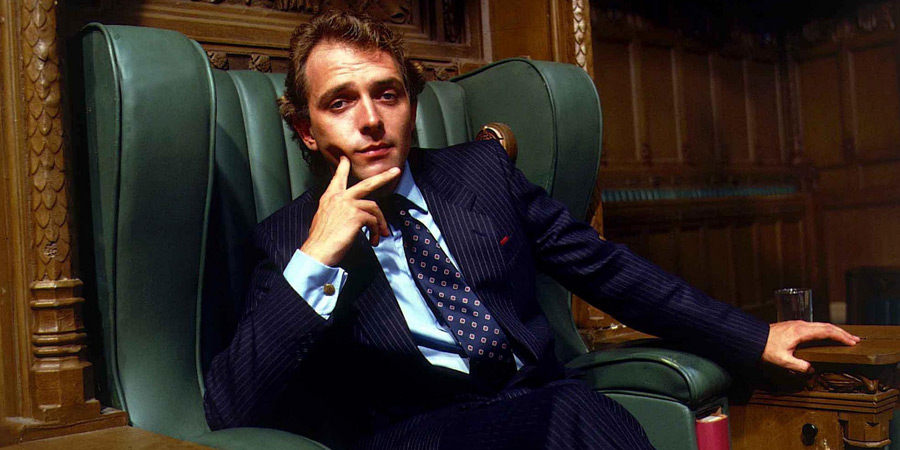
The year was 1987. Margaret Thatcher had just won her third General Election and two writers by the names of Laurence Marks and Maurice Gran were about to team up with the pan-global phenomenon that was Rik Mayall, in order to create one of the most outrageous satires Britain had ever seen.
Marks and Gran are a duo who found fame writing for Frankie Howerd. They contributed to his 1978 radio series, The Frankie Howerd Variety Show and by the early eighties they had moved on to creating their own sitcoms, such as ITV's Roots and the Peter Davison sitcom, Holding The Fort. But it was while they were making Shine On Harvey Moon that something changed. The sitcom was another successful outing for the pair, it told the story of a demobbed RAF serviceman returning home to his family shortly after the Second World War. The series starred Kenneth Cranham and also brought together Pauline Quirke and Linda Robson, who would later star in another famous Marks and Gran sitcom, Birds Of A Feather.
Shine On Harvey Moon was, in itself, a series full of social commentary. This wasn't particularly surprising considering the sitcom's entire premise rested on exploring the changing face of post-war Britain. Yet a desire to write something containing up-to-the-minute satire, began slowly to emerge. Laurence Marks explained: "Maurice and I were making Shine On Harvey Moon in Nottingham during the miner's strike, and the more I was watching the population of the Yorkshire villages starving, the more I was hating Thatcher."
By something of a coincidence, Rik Mayall, fresh from making Filthy, Rich And Catflap (the anarchic follow up to The Young Ones) was dreaming of starring in his own satirical sitcom. No stranger to satire or Thatcher gags, he had come up with the idea of playing an outrageous Tory MP, but was looking for other writers to help realise his vision. Paul Jackson (who had produced The Young Ones and was gearing up to make the first series of Red Dwarf at the time) suggested to Rik that he should meet Marks and Gran, who were at first hesitant about working with Mayall. They simply feared their comedic styles would not mix, and initially passed up on the offer of a collaboration. It was only after a chance meeting a little while later, on the set of Wogan, that they agreed to have lunch, and, charmed by Rik, the pair accepted his challenge.
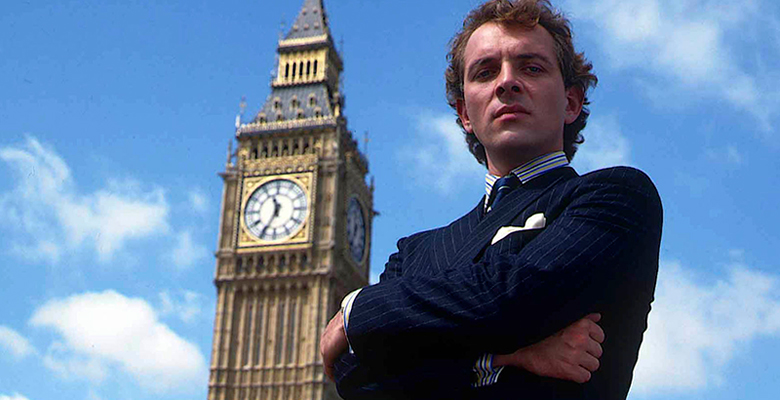
They decided right away that The New Statesman was going to be different. It would be shameless; it would be outrageous and it would be... a difficult series to get commissioned. Un-afraid, the team went out on the attack right away. They sent a 'Who's Who' fake character interview to Yorkshire Television, which introduced them to Alan Beresford B'Stard.
B'Stard is an expert parody of a loathsome politician. Simply the worst kind of Tory MP. Bribery, corruption, murder, there is simply no act of debauchery that is beyond B'Stard. In the fake interview sent to Yorkshire Television, under the heading 'Recreations' activities were listed such as: 'Dining at expensive restaurants at other people's expense' and 'grinding the faces of the poor'.
It is unclear if Rik had a hand in the B'Stard letters (he famously had a penchant for sending amusing replies to fans and companies); there's no denying that the mail had a distinctly Mayall style. Whatever the case, and whomever penned them, they got the job done. Marks and Gran received a phone call shortly after they were received asking 'when do you want to do it?'.
To help them make the series feel authentic, they enlisted the help of Labour peeress Renée Short and also wrote to their local MP, which just so happened to be Michael Portillo, whom they asked for a tour around the Commons. He obliged, and when news got out that Portillo had 'helped' the production, it did not make him popular amongst his colleagues. Rumours soon started to spread that the character of B'Stard was in fact based on Portillo, something Rik later admitted wasn't true, but nonetheless they encouraged the story at the time to garner press. However, as it turned out, B'Stard didn't need much of a launch pad to get himself noticed.
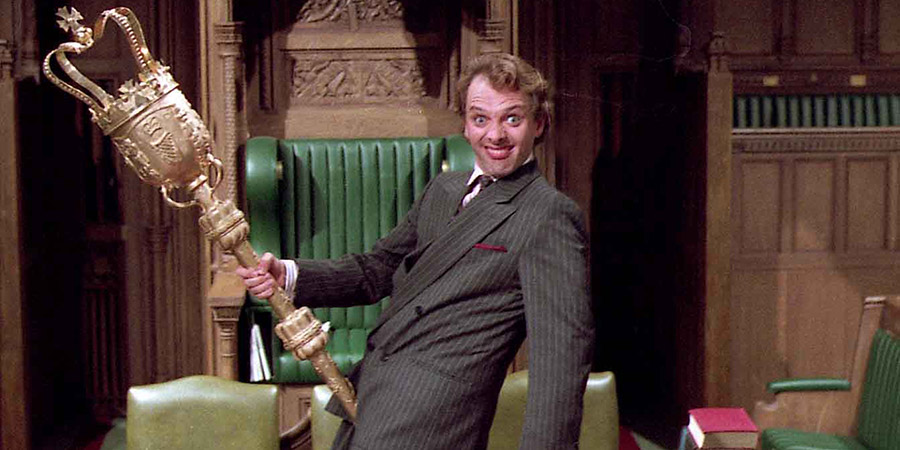
Success came almost immediately for The New Statesman. Three weeks into the first series' run, The Mirror ran a front-page making reference to B'Stard, and for Marks and Gran that was the moment that they realised they had hit on something big. The series was unique, largely because of what Rik brought to it. Cartoonish, daft slapstick with a serious anti-establishment attitude from The Young Ones, collided directly with Marks and Gran's own reimagining of Yes Minister, to create something entirely new. It blew apart the sitcom landscape and audiences went wild for it.
Studio recordings were famously riotous. The writing duo even recollected that on several occasions, rather than sitting in the producers' box, they had snuck into the audience - they wanted to watch the gregarious Rik in action (he had been known to work everybody into such a frenzy that recordings had to be briefly paused). Marks and Gran remarked that they had never seen anything quite like it before. But beyond soaking up the atmosphere, the writing duo also wanted to slip him some last-minute material. Mayall remembered that Maurice would frequently sidle up to him while he waited in the wings and say 'Here's five good ones!'. For some, suddenly having extra lines thrown into a well-rehearsed scene would be a complete nightmare; Rik, however, was ecstatic. He recalled in a TV interview, 'It was like raining gags!'.
Mayall was also known to add his own material. Marks and Gran recalled writing one script with the line 'B'Stard hits Piers'. By the time they had got to the final rehearsals, this small act of violence had been transformed into a five-minute-long torture sequence featuring poor Piers (who was all too frequently B'Stard's whipping boy) and an electric drill. When things like this happened, the whole show would overrun drastically, to which Rik would frequently suggest cutting out more of the plot. 'Can't you just remove half the story, so I can stick this thing up Piers's bottom?' he had asked.
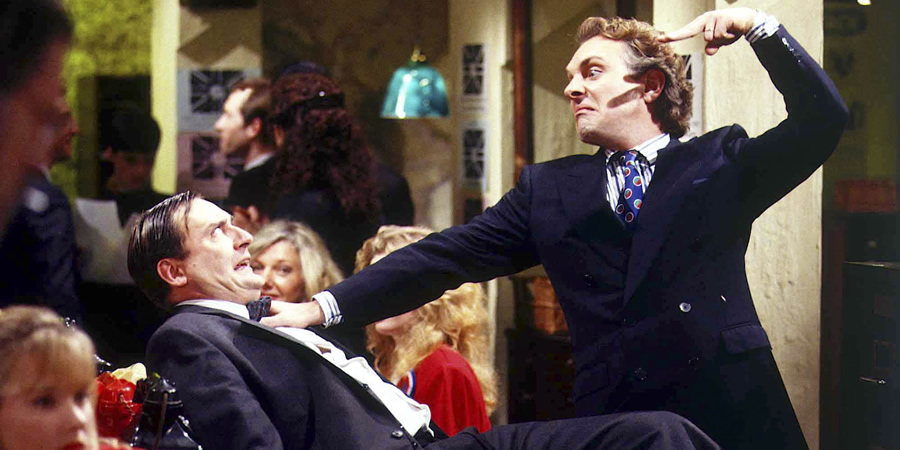
The writers often had to stand their ground in order to keep a tight schedule, filming the series week-on-week, to allow for up to the minute analysis became a huge strain. Not least for the production team, who were constantly getting letters and feared being sued for libel. Although these threats often led to last second changes, near-the-knuckle jokes were still in abundance. The series prided itself on not sugar coating anything, or talking down to its audience in any way. This was political satire for people who loved politics. The show simply did not care how outrageous anything it alleged about the political establishment appeared to be. Even in the 1988 Red Nose Day special - a chance for a fairly innocuous sketch - we saw B'Stard lobby Thatcher to take the BBC off-air.
Lady Marcia Fitzalan-Howard, who played B'Stard's wife, Sarah, admitted she was stunned by how far the series went: 'It was just incredible what they dared do,' she remembered.
It's easy to forget how shocking the sexual language would have been considered at the time; the series didn't just break political boundaries. Sarah is no shrinking violet as B'Stard's wife, while Alan's cheating on her, she's cheating on him and the carefree way in which the series introduces her as bisexual was another surprisingly progressive move for the show.
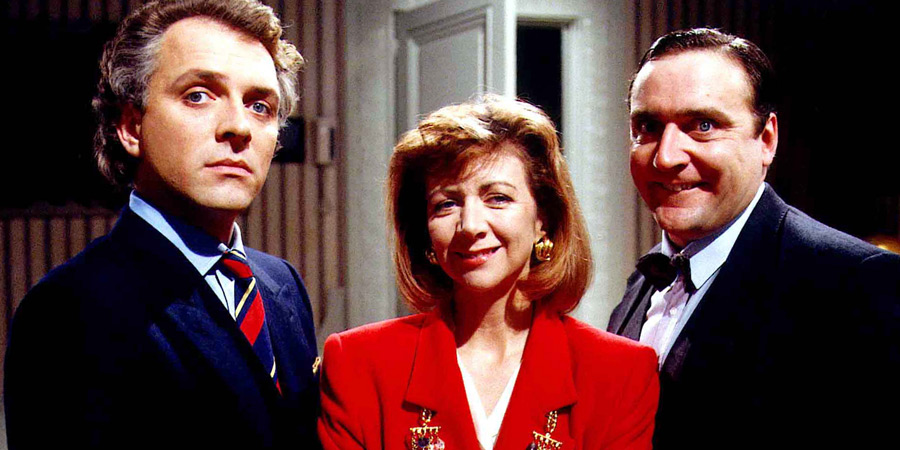
Yet the truly remarkable thing about The New Statesman was how accurate it proved to be in predicting future events. No matter how overblown or ridiculous plotlines seemed, things that started out as a fictional fancy on The New Statesman, suddenly, somehow became real. For example, B'Stard starts off as a backbencher, an MP for the fictional Haltemprice Constituency. Remarkably, this constituency became real when, amusingly enough, the boundary lines were redrawn in 1997, creating the constituency of 'Haltemprice and Howden'. On another occasion a plotline about B'Stard dumping hazardous waste under a school, became real just weeks after the episode aired.
Scandals never kept Alan down for very long. Over the course of the four series, B'Stard goes on an epic conquest, indulging in any and all political sleaze. Despite various attempts to finish him off (at one point he's even sent to a Russian Gulag) he always finds a way to get back on top and eventually works his way up the ranks again. In the final series he finds himself becoming leader of a newly formed Eurosceptic party, boasting to even have the Queen in the palm of his hands - it's this plotline that really showcases Marks and Gran's bafflingly accurate political foresight.
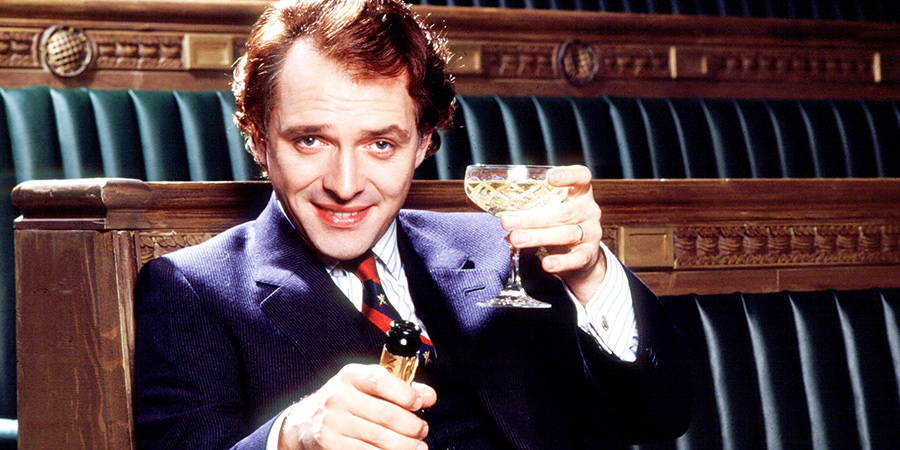
Drawing on the real-life divides emerging in John Major's government, the final episode of the fourth series drew inspiration from the Maastricht Rebellion (a Eurosceptic movement that was causing the PM serious trouble in the mid-nineties). In The New Statesman's grand finale, a special Conservative Party Conference is called to vote on Britain's continued membership of the EEC (European Economic Community). Alan leads the campaign to leave. John Major resigns as PM, and a snap General Election is called. The Conservatives then split into two - a Pro-European Federalist Party and a new Patriotic Party led by Alan B'Stard. B'Stard then essentially makes the case for a kind of Brexit. Regardless of your political persuasion, it's hard not to draw comparisons to recent events, and all from an episode that aired back in 1994.
With the writers' phenomenal political insight and Mayall's high-octane performances, it was of little surprise that the show picked up a BAFTA, but getting international recognition with an Emmy forced the team into making more series than they had initially anticipated. Incidentally, the Emmy was actually damaged in transit and had its wings glued back on the wrong way round... nobody noticed at the time.
Although the programme did eventually end after its fourth series in 1994, B'Stard never really went away. 2006 saw Rik Mayall reprise the character for the stage. The Blair B'Stard Project reimagined the character as the architect of New Labour, which prompted a Conservative MP to stand up in the Commons and ask Blair if it really was B'Stard who was advising him.
The character also continued in print. Marks and Gran penned a series of columns that appeared in The Telegraph, which, in the guise of the character, further detailed Alan's career, this time advising Labour. Eventually it's revealed that B'Stard ditched Tony and became head of a World Bank. One of his last columns in The Telegraph was titled 'So long, and thanks for all the cash'.
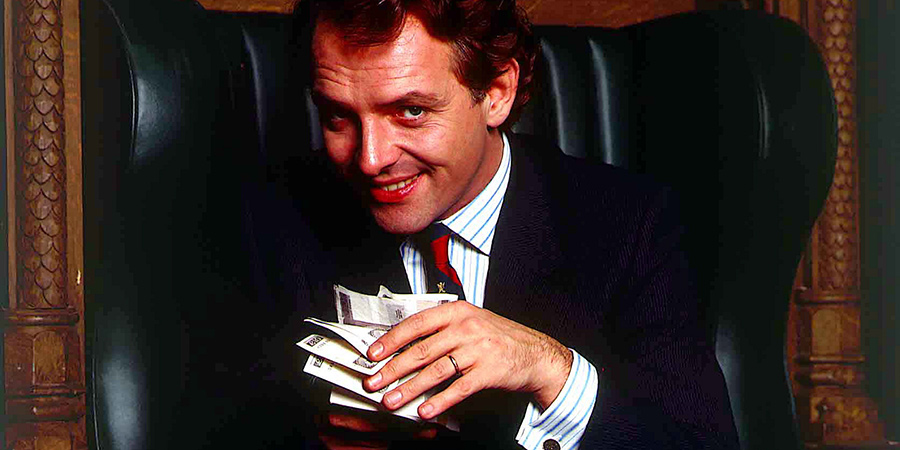
In many ways B'Stard had become real. Mayall shone brightly in the role, making even the sordid Alan a character that people ultimately loved.
'Playing Alan makes me very, very happy,' Mayall recalled. He was one of his favourite characters, so, it was only fitting that, when he tragically passed away in 2014, Alan too, had an obituary penned by the writers.
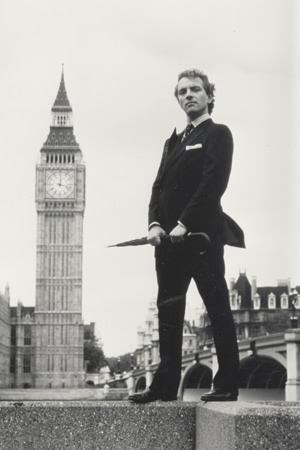
In 2017, perhaps inspired by the chaos surrounding Brexit, Marks and Gran proposed bringing back the show - but also admitted it might be difficult in the modern climate. At the height of The New Statesman's success, they reflected that once Thatcher left and was replaced by John Major things had become more challenging - a problem that also affected its satirical partner in the schedules, Spitting Image (with which it also shared a director, Geoffrey Sax). Although both series found a way to adapt, and Spitting Image has since reinvented itself for the 21st century, it's fair to say that in terms of what satire can get away with, things have changed somewhat. It's certainly hard to imagine ITV or indeed the BBC broadcasting anything quite so outrageous today. Reflecting on this, Maurice Gran told The Guardian: "People are very touchy nowadays. We were hideously rude about [Conservative MP] David Mellor. Then, on a TV show, someone said to him: 'They're really horrible about you, aren't they?' And he said: 'Well, that's their right.' They had power. They didn't care. We were just pin pricks. Though we pricked as hard as we could. So, although there's a lot about that era I abhor, I'm also nostalgic for it."
In the end, the idea of a remake (which was pitched as being about the son of B'Stard) was shelved, partly on the grounds that it became impossible to find a channel that would broadcast the show's "scurrilous filth", but also, and probably most importantly, because they were unable to find anyone to step into the great Rik Mayall's shoes.
Where to start?

Series 1, Episode 6 - Three Line Whipping
In a plotline that will be very familiar to any Rik Mayall fan, after a night indulging in his usual shameless sleaze, Alan is publicly humiliated live on national television where it was revealed, he was unaware of the previous night's by-election results. Furious, he starts a fight with a goading cabbie in the men's toilets, only to seemingly knock him stone dead with one blow. Now he has a body on his hands, not to mention a possible new career as a cab driver.Help us publish more great content by becoming a BCG Supporter. You'll be backing our mission to champion, celebrate and promote British comedy in all its forms: past, present and future.
We understand times are tough, but if you believe in the power of laughter we'd be honoured to have you join us. Advertising doesn't cover our costs, so every single donation matters and is put to good use. Thank you.
Love comedy? Find out more
